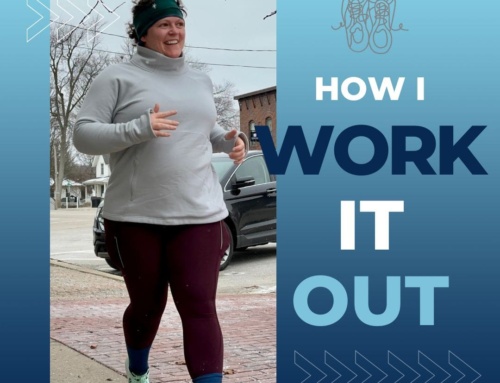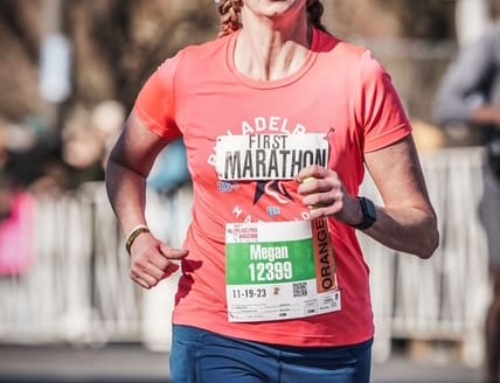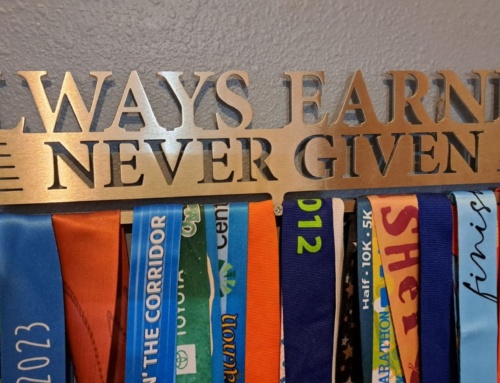
No self-doubt evident in this fabulous shot!
[Follow—and cheer for—Pam, a #motherrunner of two in Decatur, Georgia, as she trains for her first 26.2. Check out the previous entries.]
One year ago, I completed my first-ever injury-free half marathon training cycle, with the Atlanta Thanksgiving Half Marathon as my victory lap (finish time 3:09). I’d previously trained for two and completed one, and sustained significant injuries both times (an unspecified overuse injury to the left ankle that allowed me to run the Savannah Women’s Half in 2016 in 3:04 after a month of PT, and a fibular stress fracture on the right leg that forced me to bow out of the Nashville Rock ‘N Roll Half in 2017).
Since then, my Garmin tells me, I’ve run 1141 miles, which adds up to nearly 262 hours of running. And that’s not even counting bike rides, swimming, elliptical, or the strength training I’ve done five or six days a week.
About six months ago, I started the practice of intentional mental training in order to build my overall confidence and improve both my self-talk and mental toughness:
I take a moment before setting out to remind myself of the “what” (15-mile long run, slow and steady) and the “why” (build endurance through time on my feet, bolster awareness that I can run farther than I have in the past) of the run.
I do ten air squats to wake my glutes up and remind them that they’re driving the engine.
I press the button to start the workout I’ve programmed into my Garmin, and I go: one foot in front of the other, starting slowly (around a 12:25 pace) for the first mile, then slowly building up to somewhere in the 10:30-11:30 pace range for the duration.
As a result of those miles and hours of training, I’ve pretty much programmed my brain to allow my legs to do the thinking while my brain takes in the latest Serial podcast or how I could have better handled my four-year-old’s meltdown over Macy’s not carrying the sparkly rainbow boots in her size (oh the horrors of having to WAIT for their arrival via UPS!).
I have gleefully anticipated the increasing miles in my long runs for marathon training.
So you can imagine my surprise when I set out for my first “big” long run of 15 miles, the final 3-5 at race pace (9:30), and my brain immediately started taunting: You’re an imposter. There’s no way you can run 15 miles, much less a marathon. I suppose my anticipatory sleeplessness the night before, combined with the nervous pooping, typical of race mornings, not training mornings, should have clued me in that I was maybe a little less sanguine about the run than I’d have liked to admit.
I stepped out onto the street in front of my house as if it were the starting line of a race I hoped to PR. My heart rate, normally somewhere around 85 bpm when I put running shoe to pavement, was 110. I started off at my usual pace of 12:25, jittery, breath rapid, heart rate skyrocketing to 156. Downhill. My family motto is that running is like practicing bleeding. What was I thinking? Ohmygodohmygodohmygod. Ican’tdothisIcan’tdothisIcan’tdothis.
WTF, brain?! Where did THAT come from? I’m better than that, physically and mentally. I have confidence, dammit, and what’s more, I’ve worked really freaking hard to build that confidence. I love to run. I run almost every day. I build my entire schedule around running. I don’t do self-doubt.
Except, of course, it turns out that I do.
Friend and fellow BAMR Susan explains: “Self-doubt is normal. Running through it—literally—is part of what makes the [marathon training] process worth it. You can do hard things, in running and in life.”
At the time, self-doubt did not feel normal. It felt intrusive and downright insulting. And you know what? It made me MAD. I’ve worked my ass off to kick that old family motto to the curb and stomp all over it. Running is NOT like practicing bleeding. Running is like practicing breathing. Breathing. I can breathe. I can do this. If nothing else, I can continue to breathe, and I can continue to move forward. Screw you, self-doubt. I’m going to BREATHE.
And so I breathed. I breathed in for four steps, out for four steps, in for four steps, out for four steps. Those steps turned into more steps, and the steps turned into miles, and somewhere in those miles, my brain let go of the doubt.
As previously planned, I met up with my friend Katy ten miles in to participate in a local 5k race to benefit the local chapter of Autism Speaks. I pinned on my bib in the nick of time, and joined my fellow runners in the corral. If you are nervous about tacking on some race pace miles at the end of a long run, can I just say that rolling a race into your run is kind of the best thing ever? My glutes felt kind of done for, and my mind, having just fought a tough battle to simply move forward, wasn’t exactly on board for some 9:30 miles. But being surrounded by runners who had come to race revved my engine and provided some much-needed pep in my step.
I clocked in each mile of the race at exactly 9:38, which I call good enough.
It’s my understanding that the point of race pace miles is to train both your body and your mind to outrun fatigue. I realize now that it’s also about increasing self-confidence. I not only conquered a longer distance than I ever had, but I ran part of that distance pretty fast. I kept up the race pace for another half-mile, and completed the remaining 1.4 miles as a cooldown.
Michelle Obama observes that “Failure is a feeling long before it becomes an actual result. It’s vulnerability that breeds with self-doubt and then is escalated, often deliberately, by fear.” If you’ve ever completed a Perform Like a Mother seminar with sports psychologist Justin Ross, you will have heard him explain that the antidote to fear is trust. Although I wasn’t conscious of it during that 15-miler, I chose trust over fear with every step: trust in myself and in the accumulation of all the miles and hours I’ve put into training; trust in my coaches; and trust in my community.
I can live with the reality that self-doubt is part of the process, knowing that I have the tools to stop failure in its tracks long before it has a chance to become a result.
Less than a week after the 15-mile fight through self-doubt, I once again ran the Atlanta Thanksgiving Half Marathon, this time as an easy-effort training run. I ran with Katy, whom I’d met up with for the 5k, enjoying every minute with a good friend as I pointed out highlights of my local history (“There’s my current building—I work on the 42nd floor!” “There’s my old work, where I once stood up to a raging bully—and won!”). The race offered free pictures, so we made it our goal to take the best race photos ever, lifting our hands in victory as we ran beneath the Olympic rings, putting on speed and smiles as we crossed the finish line in the Georgia State University Stadium.
I crossed that finish line in 2:36:56, more than 30 minutes faster than last year—and I wasn’t even racing. Take that, self-doubt!
And yet, I know self-doubt is lurking somewhere deep in my training plan. Will it be in next week’s easy 7-miler with some fast-finish miles? Maybe it’s in an upcoming 18-miler. Or a tempo run.
The only thing that’s (although I really, really hate to admit it) certain is that self-doubt will rear its ugly head at some undetermined point in the future—and that I have the tools to conquer it: my breath, my previous miles, those wonderful BAMRs that have almost entirely overtaken my contacts list.







Consistent training- channel that “fear”- hell, don’t even label it that and same for the “self doubt” stuff. Just run and have fun and maybe you’ll surprise yourself.
Thanks for posting. I have so much self-doubt that I can’t bring myself to even sign up for a full even though I have finished 33 half marathons.
Contemplating NYCM 2019 but just don’t know if I can…
I appreciate your suggestion about including a race for the end of a long training run. I am definitely going to do that in my next training cycle long runs! Thanks for the great idea!!
You are already stronger than you think!
I distract my mind by listening to podcasts mostly, and in the tougher, later miles of a marathon, upbeat music. I try to stay in each mile by taking in the scenery, runners around me if I’m in a race, and just by thanking my lucky stars that I’m healthy enough to run so many miles!
The body achieves what the mind believes!!!!
You are so amazing and so strong! You totally got this!!
This is Imposter Syndrome! You pulled a PR half marathon out of a Nor-easter, so we (and you) already know you are a bad-ass and persistent as hell. You can totally run a marathon, Pam!
What is up with the “real runner” syndrome? Most of us struggle feeling like we are an imposter, we don’t belong in the runner club, and somehow THIS run/race will prove it? You are not the only one who struggles with this. I would like to remind all of us that the typical runner is not Shalane-quality fast or fit, so let’s stop looking at others as if they are and you are not. Playing games in our minds with doubt also leads us to judge others, and ain’t nobody got time for that in this community! As a wise educator once said to me when you see something going on in a school that is bad for kids just say “Stop it”. So when I go into self-judgement this becomes my mantra: “Stop it.” Thanks for sharing your thoughts – we are in thins fight together, and I appreciate all of your awesomeness!
I just completed my first marathon last month!!! Go you!! Like you, I worked so hard at building mental strength & self confidence! But when the self doubt hit, I learned to fight it with gratefulness! I look around and start thanking my God for EVERY little thing… the beautiful sky, strong legs, sounds of the birds’ singing, my husband that watches our boys while I run, etc etc. It distracts me plus it leaves me feeling so thankful that it’s hard to feel down on myself!
You Rock, Girl!